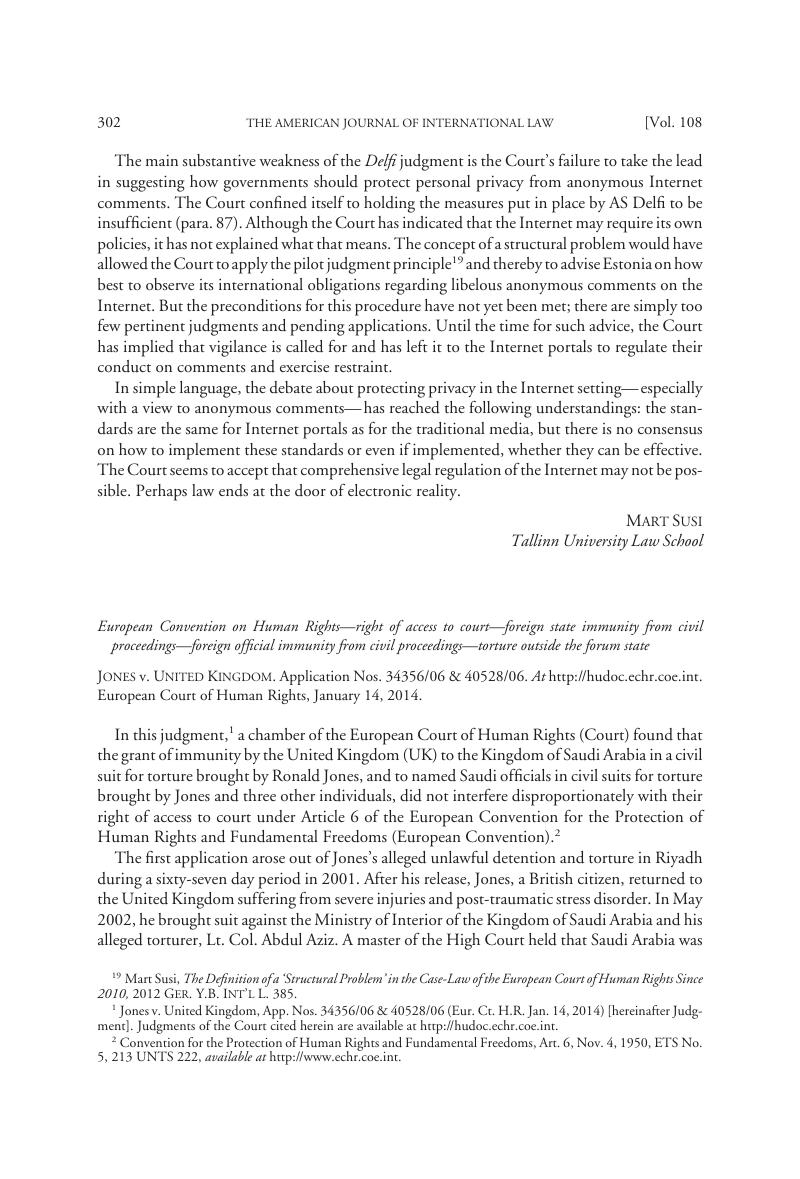No CrossRef data available.
Published online by Cambridge University Press: 20 January 2017

1 Jones v. United Kingdom, App. Nos. 34356/06 & 40528/06 (Eur. Ct. H.R. Jan. 14, 2014) [hereinafter Judgment]. Judgments of the Court cited herein are available at http://hudoc.echr.coe.int.
2 Convention for the Protection of Human Rights and Fundamental Freedoms, Art. 6, Nov. 4, 1950, ETS No. 5, 213 UNTS 222, available at http://www.echr.coe.int.
3 State Immunity Act, 1978, c. 33.
4 Jones v. Ministry of Interior al-Mamlaka al-Arabiya as Saudiya, [2004] EWCA (Civ) 1394, [2005] Q.B. 699. The British decisions cited herein are available at http://www.bailii.org.
5 Jones v. Ministry of Interior al-Mamlaka al-Arabiya as Saudiya, [2006] UKHL 26, [2007] 1 A.C. 270.
6 Al-Adsani v. United Kingdom, 2001-XI Eur. Ct. H.R. 79, para. 63.
7 Id., para. 52.
8 Id., para. 56.
9 Id., para. 66.
10 Jurisdictional Immunities of the State (Ger. v. It.: Greece Intervening), 2012 ICJ Rep. 99 (Feb. 3).
11 Similarly, in Germany v. Italy, the International Court of Justice emphasized that it was “addressing only the immunity of the State itself from the jurisdiction of the courts of other States; the question of whether, and if so to what extent, immunity might apply in criminal proceedings against an official of the State is not in issue in the present case.” Id. at 139, para. 91.
12 See also Judgment, para. 210.
13 Prosecutor v. Blaškić, Case No. IT-95-14, Appeals Judgment on Request for Review of Decision of 18 July 1997, para. 38 (Int’l Crim. Trib. for Former Yugoslavia Oct. 29, 1997), at http://www.icty.org.
14 As Lady Hazel Fox has observed, courts cannot exercise jurisdiction over foreign officials in suits for commercial transactions “not because the official is immune... but because the law attributes responsibility to the State and not to the official.” Fox, Hazel, Imputability and Immunity as Separate Concepts: The Removal of Immunity from Civil Proceedings Relating to the Commission of an International Crime, in International Law and Power: Perspectives of LegalOrder and Justice 165, 173 (Kaikobad, Kaiyan Homi & Bohlander, Michael eds., 2009)Google Scholar.
15 See United Nations Convention on Jurisdictional Immunities of States and Their Property, Art. 2(1)(b)(iv), GA Res. 59/38, annex (Dec. 2, 2004), 44 ILM 803 (2005) (not yet in force).
16 The articles on state responsibility take a broad approach to attribution but specify in Article 58 that this approach is”without prejudice to any question of the individual responsibility under international law of any person acting on behalf of a State.” Draft Articles on Responsibility of States for Internationally Wrongful Acts and Commentaries, Art. 58, in Report of the International Law Commission on the Work of Its Fifty-Third Session, [2001] 2 Y.B. Int’l L. Comm’n 30, 142, UN Doc. A/CN.4/SER.A/2001/Add.1 (Part 2).
17 Principles of International Law Recognized in the Charter of the Nôrnberg Tribunal and in the Judgment of the Tribunal, Principle I, in Report of the International Law Commission on Its Second Session, para. 97, [1950] 2 Y.B. Int’l L. Comm’n 374, UN Doc. A/CN.4/34.
18 Keitner, Chimène I., The Forgotten History of Foreign Official Immunity, 87 N.Y.U. L. Rev. 704 (2012)Google Scholar.
19 Al-Adsani v. United Kingdom, supra note 6, paras. 14–15.
20 Regina v. Bow Street Metropolitan Stipendiary Magistrate, ex parte Pinochet Ugarte, [1999] UKHL 17, [2000] 1 A.C. 147 (Pinochet III).
21 Judge Bianku indicated that he had joined the majority’s opinion “with great hesitation.” He would have preferred to relinquish the case to the Grand Chamber “to consider whether Al-Adsani still remains good law,” given its narrow majority and the “very significant developments” in the intervening thirteen years. Judgment, Concurring Opinion of Judge Bianku.
22 Samantar v. Yousuf, 560 U.S. 305, 325 (2010).
23 In the United States, the immunity ratione materiae of foreign officials is governed by the common law, see id., unless they are covered by the Diplomatic Relations Act.
24 Islamic Republic of Iran v. Hashemi, 2012 QCCA 1449 (Can. Que. C.A.), at http://canlii.ca/t/fsc3n. Leave to appeal was granted sub nom. Estate of Kazemi v. Islamic Republic of Iran (S.C.C. Mar. 7, 2013) (No. 35034). International Law Commission, Immunity of State Officials from Foreign Criminal Jurisdiction, at http://legal.un.org/ilc/guide/4_2.htm (containing various materials on the subject). The Institute of International Law considered the issue of individual immunity ratione materiae in both civil and criminal proceedings and resolved that “[n]o immunity from jurisdiction other than personal immunity [ratione personae] in accordance with international law applies with regard to international crimes.” Institute of International Law, Naples Session, Resolution on the Immunity from Jurisdiction of the State and of Persons Who Act on Behalf of the State in Case of International Crimes, Art. III(1) (2009), at http://www.idi-iil.org.
25 Rome Statute of the International Criminal Court, Art. 17(1), July 17, 1998, 2187 UNTS 3.
26 Convention Against Torture and Other Cruel, Inhuman or Degrading Treatment or Punishment, Art. 14, Dec. 10, 1984, S. Treaty Doc. No. 20-100 (1988), 1465 UNTS 85 (providing that state parties must ensure that victims of torture obtain redress and have an enforceable right to fair and adequate compensation); Committee Against Torture, General Comment No. 3: Implementation of Article 14 by States Parties, UN Doc.CAT/C/GC/3 (Nov. 19, 2012).